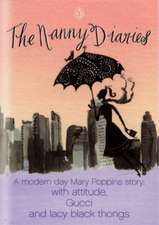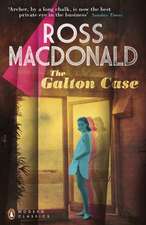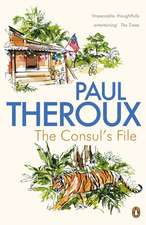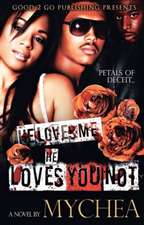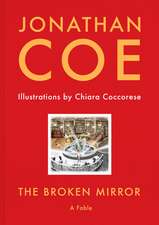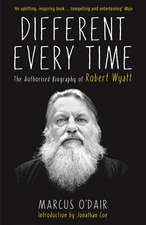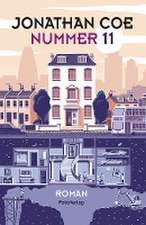The Terrible Privacy of Maxwell Sim
Autor Jonathan Coeen Limba Engleză Paperback – 29 feb 2012
A modern-day picaresque from Jonathan Coe—acclaimed author of The Rotters’ Club—The Terrible Privacy of Maxwell Sim explores the difficulties of making genuine connections in a world of advanced communications technology and rampant social networking.
| Toate formatele și edițiile | Preț | Express |
|---|---|---|
| Paperback (2) | 63.88 lei 3-5 săpt. | +10.46 lei 7-13 zile |
| Penguin Books – 25 iun 2014 | 63.88 lei 3-5 săpt. | +10.46 lei 7-13 zile |
| VINTAGE BOOKS – 29 feb 2012 | 129.97 lei 3-5 săpt. |
Preț: 129.97 lei
Nou
Puncte Express: 195
Preț estimativ în valută:
24.87€ • 27.10$ • 20.96£
24.87€ • 27.10$ • 20.96£
Carte disponibilă
Livrare economică 02-16 aprilie
Preluare comenzi: 021 569.72.76
Specificații
ISBN-13: 9780307742155
ISBN-10: 0307742156
Pagini: 384
Dimensiuni: 132 x 203 x 23 mm
Greutate: 0.3 kg
Editura: VINTAGE BOOKS
ISBN-10: 0307742156
Pagini: 384
Dimensiuni: 132 x 203 x 23 mm
Greutate: 0.3 kg
Editura: VINTAGE BOOKS
Notă biografică
Jonathan Coe’s awards include the John Llewellyn Rhys Prize, the Prix du Meilleur Livre Étranger, the Prix Médicis Étranger, and, for The Rotters’ Club, the Bollinger Everyman Wodehouse Prize. He lives in London with his wife and their two daughters.
Visit the author’s website: www.jonathancoewriter.com.
Visit the author’s website: www.jonathancoewriter.com.
Extras
1
When I saw the Chinese woman and her daughter playing cards together at their restaurant table, the water and the lights of Sydney Harbour shimmering behind them, it set me thinking about Stuart, and the reason he had to give up driving his car.
I was going to say “my friend Stuart,” but I suppose he’s not a friend anymore. I seem to have lost a number of friends in the last few years. I don’t mean that I’ve fallen out with them, in any dramatic way. We’ve just decided not to stay in touch. And that’s what it’s been: a decision, a conscious decision, because it’s not difficult to stay in touch with people nowadays, there are so many different ways of doing it. But as you get older, I think that some friendships start to feel increasingly redundant. You just find yourself asking, “What’s the point?” And then you stop.
Anyway, about Stuart and his driving. He had to stop because of the panic attacks. He was a good driver, a careful and conscientious driver, and he had never been involved in an accident. But occasionally, when he got behind the wheel of a car, he would experience these panic attacks, and after a while they started to get worse, and they started to happen more often. I can remember when he first started telling me about all this: it was lunchtime and we were in the canteen of the department store in Ealing, where we worked together for a year or two. I don’t think I can have listened very carefully, though, because Caroline was sitting at the same table, and things between us were just starting to get interesting, so the last thing I wanted to hear about was Stuart and his neuroses about driving. That must be why I never really thought about it again until years later, at the restaurant on Sydney Harbour, when it all came back. His problem, as far as I can remember, was this: Whereas most people, as they watched the coming and going of cars on a busy road, would see a normal, properly functioning traffic system, Stuart could only perceive it as an endless succession of narrowly averted accidents. He saw cars hurtling towards each other at considerable speeds, and missing each other by inches—time and time again, every few seconds, repeated constantly throughout the day. “All those cars,” he said to me, “only just managing not to crash into each other. How can people stand it?” In the end it became too much for him to contemplate, and he had to stop driving.
Why had this conversation just come back to me, tonight of all nights? It was 14 February 2009. The second Saturday in February. Valentine’s Day, in case you hadn’t noticed. The water and the lights of Sydney Harbour were shimmering behind me, and I was dining alone since my father had, for various weird reasons of his own, refused to come out with me, even though this was my last evening in Australia, and the only reason for my visiting Australia in the first place had been to see him and try to rebuild my relationship with him. Right now, in fact, I was probably feeling more alone than I had ever felt in my life, and what really brought it home to me was the sight of the Chinese woman and her daughter playing cards together at their restaurant table. They looked so happy in each other’s company. There was such a connection between them. They weren’t talking very much, and when they did talk, it was about their card game, as far as I could tell, but that didn’t matter. It was all in their eyes, their smiles, the way they kept laughing, the way they kept leaning in to each other. By comparison, none of the diners at the other tables seemed to be having any fun. Sure, they were all laughing and talking too. But they didn’t seem to be entirely absorbed in each other, the way the Chinese woman and her daughter did. There was a couple sitting opposite me, out on a Valentine’s Day date by the looks of it: he kept checking his watch, she kept checking her mobile for text messages. Behind me there was a family of four: the two little boys were playing on their Nintendo DSs, and the husband and wife hadn’t spoken to each other for about ten minutes. To the left of me, slightly blocking my view of the waterfront, was a group of six friends: two of them were involved in this big argument which had started out as a discussion of global warming, and now seemed to have more to do with economics; neither of them was giving any ground, while the other four sat there in bored silence, looking on. An elderly couple on the other side of me had chosen to sit side by side at their table, rather than opposite each other, so that they could both look at the view instead of talking. None of this depressed me, exactly. I daresay that all of these people would go home thinking they’d had a perfectly enjoyable night out. But it was only the Chinese woman and her daughter who I really envied. It was clear they had something precious: something I wanted badly. Something I wanted to share in.
How could I be sure that she was Chinese? Well, I couldn’t. But she looked Chinese to me. She had long black hair, slightly wild and unkempt. A thin face, with prominent cheekbones. (Sorry, I am just not very good at describing people.) Bright red lipstick, which struck me as an odd touch. A lovely smile, slightly tight-lipped but all the brighter for that, somehow. She was expensively dressed, with some sort of black chiffon scarf (I am not very good at describing clothes either—are you looking forward to the next few hundred pages?) held in place by a large golden brooch. So she was well-off. Elegant—that would be a good word to describe her. Very elegant. Her daughter was well dressed too, and also had black hair (well, you don’t get many Chinese blondes), and seemed to be about eight or nine years old. She had a beautiful laugh: it started as a throaty chuckle and then bubbled up into a series of giggles which cascaded and finally died away like a stream tumbling down a hillside into a series of pools. ( Just like the ones Mum and I used to walk past whenever she took me for a walk on the Lickey Hills, all those years ago, at the back of the Rose and Crown pub, on the edge of the municipal golf course. I suppose that’s what her laugh reminded me of, and perhaps that’s another of the reasons the Chinese girl and her mother made such an impression on me that evening.) I don’t know what was making her laugh so much: something to do with the card game, which wasn’t a really silly, childish one like snap, but didn’t seem to be very serious or grown-up either. Perhaps they were playing knockout whist or something like that. Whatever it was, it was making the little girl laugh, and her mother was playing along with her laughter, encouraging it, joining in, surfing on its waves. It was such a pleasure to look at them, but I had to ration my glances, in case they noticed I was looking and the Chinese woman decided I was some kind of creep. Once or twice she had noticed me looking at her and had held my gaze for a couple of seconds, but it wasn’t long enough, I couldn’t read any kind of invitation into it, and after those couple of seconds she looked away and she and her daughter would start talking and laughing again, quickly rebuilding that wall of intimacy, that protective screen.
Right at that moment, I would have liked to text Stuart, but I didn’t have his mobile number anymore. I would have liked to text him to say that I understood, now, what it was he’d been trying to tell me about cars. Cars are like people. We mill around every day, we rush here and there, we come within inches of touching each other, but very little real contact goes on. All those near misses. All those might-have-beens. It’s frightening, when you think about it. Probably best not to think about it at all.
Can you remember where you were the day John Smith died? I suspect that most people can’t. In fact I suspect that many people can’t even remember who John Smith was. Well, there have been a lot of John Smiths, of course, over the years, but the one I’m thinking of was the leader of the British Labour Party, who died of a heart attack in 1994. I realise his death doesn’t have the global resonance of a JFK or a Princess Diana, but I can still remember where I was, with absolute clarity. I was in the canteen of that department store in Ealing, having my lunch. Stuart was with me, and two or three other guys including one called Dave, who was an absolute pain in the arse. He worked in electrical goods and was just the kind of man I can’t stand. Loud and boring and much too sure of himself. And sitting at the table next to ours, all by herself, was this lovely woman in her early twenties with shoulder-length, light-brown hair, who looked lonely and out of place and kept glancing in our direction. Her name (as I was to find out, soon enough) was Caroline.
I’d only been working at the department store for a month or two. Before then I’d spent two or three years on the road selling toys for a company based in St. Albans. It was a nice enough job, in a way. I became good friends with the other south-eastern rep, Trevor Paige, and we had some great times together, in those two or three years, but I never enjoyed being on the road as much as he did, and it wasn’t long before the novelty of all that travelling had well and truly worn off. I started looking for a chance to settle down. I’d recently put down the deposit on a nice little terraced house in Watford (not far from Trevor’s, as it happened) and was keeping my eyes open for a new job opportunity. The store in Ealing had always been one of my regular calling points, and I’d also made it my business to become friendly with Stuart, who ran the toy department. There’s always something rather artificial, I suppose, about friendships formed for business reasons, but Stuart and I did genuinely grow to like each other, and after a while I tried to make sure that Ealing would be my last call of the day, so we could go out for a quick drink together after we’d had our meeting. And then one evening Stuart called me at home, outside work hours, and told me that he was being promoted to a job in the office upstairs, and he invited me to apply for his job running the toy department. Well, I hesitated at first, worrying how Trevor was going to react; but in the event, he was fine about it. He knew it was just what I’d been looking for. So a couple of months later, I found myself working in Ealing fulltime, and having lunch every day in the canteen with Stuart and his colleagues, and that was when I started to notice this lovely woman in her early twenties with light-brown hair who always seemed to be eating lunch by herself at the next table.
It all seems like such a long time ago, now. Anything seemed possible, in those days. Anything at all. I wonder if that feeling ever comes back?
Best not to go down that path.
OK, then: the death of John Smith. There was a bunch of us guys in the canteen that day, sitting at one of the Formica-topped tables having our lunch. It was early in the summer of 1994. Don’t ask me if it was sunny or rainy, though, because no sense of the weather outside ever managed to filter through to that dimly lit space. We took our lunches in a sort of perpetual twilight. What was different about that day, however, was that Dave—that’s the obnoxious guy from electrical goods, the one I couldn’t stand—had asked Caroline to join us. Clearly, his plan was to try chatting her up, but it was all rather painful to witness because he kept making all the wrong moves. After failing to impress her with a description of his sports car and the state-of-the-art stereo system at his fancy bachelor pad in Hammersmith, he turned to the subject of John Smith’s death—which had been announced on the radio that morning—and started using it as an excuse for a series of bad-taste jokes about heart attacks. Things like this: apparently, following Smith’s first heart attack in the late 1980s, the doctors had been able to revive his heart but not his brain—so was it any wonder that they’d made him leader of the Labour Party? Caroline’s response to this attempt at humour was to persist with the contemptuous silence she had maintained throughout the meal; and apart from some tepid waves of laughter there was no reaction from anyone until I heard myself saying—slightly to my own astonishment—“That’s not funny, Dave. Not funny at all.” Most of the guys had finished their lunches by now, and it wasn’t long before people started getting up and leaving, but not me and Caroline: neither of us said anything, but we both decided to stay behind and linger over our puddings, as if by some unspoken agreement. And so for a minute or two we sat there in awkward, expectant silence, until I made an embarrassed comment about sensitivity not being Dave’s strong point, and then, for the very first time, Caroline spoke.
That was the same moment, I believe, that I fell in love with her. It was her voice, you see. I had been expecting something clipped and ultra-refined to go with her looks, but instead she came out with this really broad, down-to-earth Lancastrian accent. It took me so much by surprise—I was so enthralled by it—that at first I forgot to listen to what she was actually saying and just let her voice play over me, almost as if she was talking in some mellifluous foreign language. Quickly, though, before I made too disastrous an impression, I pulled myself together and started to concentrate and realised that she was asking me why I hadn’t joined in with the jokes. She wanted to know if it was because I was a Labour supporter and I said no, it was nothing to do with that at all. I just told her I didn’t think it was right to make jokes about someone so soon after he had died, especially when he had always seemed to be a decent man and was leaving a wife and a family behind. Caroline agreed with me about that but she also seemed to be sorry about his death for a different reason: she thought it had come at a terrible time for British politics and said that John Smith would probably have won the next election and might have turned out to be a great prime minister.
Well, I admit it was not the sort of conversation you usually heard in the canteen of the department store, let alone the sort that I very often took part in myself. I’ve never been very interested in politics. (In fact, I didn’t even vote in the last two elections, although I did eventually vote for Tony Blair in 1997, mainly because I thought it was what Caroline wanted me to do.) And when I found out, as I soon did, that Caroline was working in the maternity section of the department store only as a temporary measure, while she began her first novel, I felt even more out of my depth. I hardly ever read novels, never mind trying to write one. But in a way this only fuelled my curiosity. I couldn’t work Caroline out, you see. After spending all those years on the road, cold-calling people and trying to sell them stuff, I was fairly satisfied with my ability to size people up and decide, in the space of a few seconds, what it was that made them tick. But I hadn’t met many people like Caroline. I’d never been to university (she was a history graduate from Manchester) and had spent most of my adult life in the company of men—businessmen, at that. The kind of people who never gave away much about themselves when they talked and tended to take the status quo for granted. Compared to them, Caroline was an unknown quantity. I couldn’t even begin to guess what had brought her to this job.
She gave me the explanation for that on our first date, and a very sad story it turned out to be. We were in a branch of Spaghetti House (one of my favourite chains, back in those days, though you don’t see so many of them anymore) and while Caroline picked at her tagliatelle carbonara she told me that, when she was at university in Manchester, she’d got quite deeply involved with a man who was studying English in the same year as her. Then he’d got a job in London, working in a TV production company, so they’d both moved down and found themselves a flat in Ealing. Caroline’s real ambition was to write books—novels and short stories—so she took the job in the department store as a temporary thing, trying to get on with her writing in the evening and at weekends. Meanwhile, her boyfriend started an affair with someone he’d met at the production company, and fell madly in love with her, and within a couple of weeks he’d dumped Caroline and moved out, and she was left all by herself, living somewhere where she had no friends and doing a job in which she had no interest.
Well, the truth is obvious enough now, isn’t it? There’s a phrase, a cliché, for the state Caroline was in back then: on the rebound. She liked me because I was being kind to her, and because I’d caught her at a low ebb, and because I probably wasn’t quite as crass and insensitive as the other guys in the canteen. But there’s no denying, in retrospect, that I was out of her league. In a way it’s amazing we lasted as long as we did. But of course, you can’t see into the future. I usually have trouble seeing a couple of weeks ahead, never mind fifteen years. Back then we were young and naive, and at the end of that evening in the Spaghetti House, when I asked her if she’d like to drive out into the country with me at the weekend, neither of us had the slightest idea where it would lead, and all I can remember now is the shining light of gratitude in her eyes as she said yes.
Fifteen years ago. Is fifteen years a long time, or a short time? I suppose everything is relative. Set against the history of mankind, fifteen years is just the blink of an eye, but it also seemed that I had travelled a long way, an unimaginably long way, from the hope and excitement of that faraway first date in the Spaghetti House to the evening a few months ago, 14 February 2009, when (at the age of forty-eight) I found myself sitting alone at a restaurant in Australia, the water and the lights of Sydney Harbour shimmering behind me, and I couldn’t stop staring at the beautiful Chinese woman and her little daughter who were playing cards together at their table. Caroline had left home by then. Walked out, I mean. She had been gone six months and had taken our daughter, Lucy, with her. They had moved up north, to Kendal in the Lake District. What was it, finally, that drove her away? Just a long-standing build-up of frustration, I suppose. Apart from the birth of Lucy, it seemed that the last fifteen years hadn’t brought Caroline any of the things she’d been hoping for. The great novel remained unwritten. She hadn’t even managed to finish a short story, so far as I knew. Lucy’s arrival had put paid to a lot of that. Mother- hood is pretty demanding, after all. I certainly couldn’t see why being married to me should stop her from writing anything, if that’s what she really wanted to do. Another thing that occurs to me is that, deep down (and this is painful to admit), Caroline might have been a little bit ashamed of me. Of my job, to be more precise. I’d moved on, by now, to one of the biggest and most prestigious department stores in central London, where I was employed as an After-Sales Customer Liaison Officer. It was an excellent job, as far as I could see. But maybe there was a part of her that thought the husband of an aspiring writer should do something a bit more . . . I don’t know—artistic? intellectual? You’d think we might have discussed some of these issues, but the saddest thing about our marriage, during the last few years, had been the almost complete lack of communication. We seemed to have forgotten the art of talking to each other, except in the form of screaming rows accompanied by the swapping of painful insults and the hurling of household objects. I won’t rehearse all the details but I do remember one of our exchanges, from the penultimate squabble or perhaps the one before that. We had begun by arguing over whether to use an abrasive scourer or a soft sponge to clean off the stainless-steel surface of our cooker, and within about thirty seconds I heard myself telling Caroline that it was clear she didn’t love me anymore. When she failed to deny it, I said, “Sometimes I don’t even think you like me that much,” and do you know what she said to that? She said, “How can anybody like a man who doesn’t even like himself ?”
Well, if she was going to talk in riddles, we would never get anywhere.
When I saw the Chinese woman and her daughter playing cards together at their restaurant table, the water and the lights of Sydney Harbour shimmering behind them, it set me thinking about Stuart, and the reason he had to give up driving his car.
I was going to say “my friend Stuart,” but I suppose he’s not a friend anymore. I seem to have lost a number of friends in the last few years. I don’t mean that I’ve fallen out with them, in any dramatic way. We’ve just decided not to stay in touch. And that’s what it’s been: a decision, a conscious decision, because it’s not difficult to stay in touch with people nowadays, there are so many different ways of doing it. But as you get older, I think that some friendships start to feel increasingly redundant. You just find yourself asking, “What’s the point?” And then you stop.
Anyway, about Stuart and his driving. He had to stop because of the panic attacks. He was a good driver, a careful and conscientious driver, and he had never been involved in an accident. But occasionally, when he got behind the wheel of a car, he would experience these panic attacks, and after a while they started to get worse, and they started to happen more often. I can remember when he first started telling me about all this: it was lunchtime and we were in the canteen of the department store in Ealing, where we worked together for a year or two. I don’t think I can have listened very carefully, though, because Caroline was sitting at the same table, and things between us were just starting to get interesting, so the last thing I wanted to hear about was Stuart and his neuroses about driving. That must be why I never really thought about it again until years later, at the restaurant on Sydney Harbour, when it all came back. His problem, as far as I can remember, was this: Whereas most people, as they watched the coming and going of cars on a busy road, would see a normal, properly functioning traffic system, Stuart could only perceive it as an endless succession of narrowly averted accidents. He saw cars hurtling towards each other at considerable speeds, and missing each other by inches—time and time again, every few seconds, repeated constantly throughout the day. “All those cars,” he said to me, “only just managing not to crash into each other. How can people stand it?” In the end it became too much for him to contemplate, and he had to stop driving.
Why had this conversation just come back to me, tonight of all nights? It was 14 February 2009. The second Saturday in February. Valentine’s Day, in case you hadn’t noticed. The water and the lights of Sydney Harbour were shimmering behind me, and I was dining alone since my father had, for various weird reasons of his own, refused to come out with me, even though this was my last evening in Australia, and the only reason for my visiting Australia in the first place had been to see him and try to rebuild my relationship with him. Right now, in fact, I was probably feeling more alone than I had ever felt in my life, and what really brought it home to me was the sight of the Chinese woman and her daughter playing cards together at their restaurant table. They looked so happy in each other’s company. There was such a connection between them. They weren’t talking very much, and when they did talk, it was about their card game, as far as I could tell, but that didn’t matter. It was all in their eyes, their smiles, the way they kept laughing, the way they kept leaning in to each other. By comparison, none of the diners at the other tables seemed to be having any fun. Sure, they were all laughing and talking too. But they didn’t seem to be entirely absorbed in each other, the way the Chinese woman and her daughter did. There was a couple sitting opposite me, out on a Valentine’s Day date by the looks of it: he kept checking his watch, she kept checking her mobile for text messages. Behind me there was a family of four: the two little boys were playing on their Nintendo DSs, and the husband and wife hadn’t spoken to each other for about ten minutes. To the left of me, slightly blocking my view of the waterfront, was a group of six friends: two of them were involved in this big argument which had started out as a discussion of global warming, and now seemed to have more to do with economics; neither of them was giving any ground, while the other four sat there in bored silence, looking on. An elderly couple on the other side of me had chosen to sit side by side at their table, rather than opposite each other, so that they could both look at the view instead of talking. None of this depressed me, exactly. I daresay that all of these people would go home thinking they’d had a perfectly enjoyable night out. But it was only the Chinese woman and her daughter who I really envied. It was clear they had something precious: something I wanted badly. Something I wanted to share in.
How could I be sure that she was Chinese? Well, I couldn’t. But she looked Chinese to me. She had long black hair, slightly wild and unkempt. A thin face, with prominent cheekbones. (Sorry, I am just not very good at describing people.) Bright red lipstick, which struck me as an odd touch. A lovely smile, slightly tight-lipped but all the brighter for that, somehow. She was expensively dressed, with some sort of black chiffon scarf (I am not very good at describing clothes either—are you looking forward to the next few hundred pages?) held in place by a large golden brooch. So she was well-off. Elegant—that would be a good word to describe her. Very elegant. Her daughter was well dressed too, and also had black hair (well, you don’t get many Chinese blondes), and seemed to be about eight or nine years old. She had a beautiful laugh: it started as a throaty chuckle and then bubbled up into a series of giggles which cascaded and finally died away like a stream tumbling down a hillside into a series of pools. ( Just like the ones Mum and I used to walk past whenever she took me for a walk on the Lickey Hills, all those years ago, at the back of the Rose and Crown pub, on the edge of the municipal golf course. I suppose that’s what her laugh reminded me of, and perhaps that’s another of the reasons the Chinese girl and her mother made such an impression on me that evening.) I don’t know what was making her laugh so much: something to do with the card game, which wasn’t a really silly, childish one like snap, but didn’t seem to be very serious or grown-up either. Perhaps they were playing knockout whist or something like that. Whatever it was, it was making the little girl laugh, and her mother was playing along with her laughter, encouraging it, joining in, surfing on its waves. It was such a pleasure to look at them, but I had to ration my glances, in case they noticed I was looking and the Chinese woman decided I was some kind of creep. Once or twice she had noticed me looking at her and had held my gaze for a couple of seconds, but it wasn’t long enough, I couldn’t read any kind of invitation into it, and after those couple of seconds she looked away and she and her daughter would start talking and laughing again, quickly rebuilding that wall of intimacy, that protective screen.
Right at that moment, I would have liked to text Stuart, but I didn’t have his mobile number anymore. I would have liked to text him to say that I understood, now, what it was he’d been trying to tell me about cars. Cars are like people. We mill around every day, we rush here and there, we come within inches of touching each other, but very little real contact goes on. All those near misses. All those might-have-beens. It’s frightening, when you think about it. Probably best not to think about it at all.
Can you remember where you were the day John Smith died? I suspect that most people can’t. In fact I suspect that many people can’t even remember who John Smith was. Well, there have been a lot of John Smiths, of course, over the years, but the one I’m thinking of was the leader of the British Labour Party, who died of a heart attack in 1994. I realise his death doesn’t have the global resonance of a JFK or a Princess Diana, but I can still remember where I was, with absolute clarity. I was in the canteen of that department store in Ealing, having my lunch. Stuart was with me, and two or three other guys including one called Dave, who was an absolute pain in the arse. He worked in electrical goods and was just the kind of man I can’t stand. Loud and boring and much too sure of himself. And sitting at the table next to ours, all by herself, was this lovely woman in her early twenties with shoulder-length, light-brown hair, who looked lonely and out of place and kept glancing in our direction. Her name (as I was to find out, soon enough) was Caroline.
I’d only been working at the department store for a month or two. Before then I’d spent two or three years on the road selling toys for a company based in St. Albans. It was a nice enough job, in a way. I became good friends with the other south-eastern rep, Trevor Paige, and we had some great times together, in those two or three years, but I never enjoyed being on the road as much as he did, and it wasn’t long before the novelty of all that travelling had well and truly worn off. I started looking for a chance to settle down. I’d recently put down the deposit on a nice little terraced house in Watford (not far from Trevor’s, as it happened) and was keeping my eyes open for a new job opportunity. The store in Ealing had always been one of my regular calling points, and I’d also made it my business to become friendly with Stuart, who ran the toy department. There’s always something rather artificial, I suppose, about friendships formed for business reasons, but Stuart and I did genuinely grow to like each other, and after a while I tried to make sure that Ealing would be my last call of the day, so we could go out for a quick drink together after we’d had our meeting. And then one evening Stuart called me at home, outside work hours, and told me that he was being promoted to a job in the office upstairs, and he invited me to apply for his job running the toy department. Well, I hesitated at first, worrying how Trevor was going to react; but in the event, he was fine about it. He knew it was just what I’d been looking for. So a couple of months later, I found myself working in Ealing fulltime, and having lunch every day in the canteen with Stuart and his colleagues, and that was when I started to notice this lovely woman in her early twenties with light-brown hair who always seemed to be eating lunch by herself at the next table.
It all seems like such a long time ago, now. Anything seemed possible, in those days. Anything at all. I wonder if that feeling ever comes back?
Best not to go down that path.
OK, then: the death of John Smith. There was a bunch of us guys in the canteen that day, sitting at one of the Formica-topped tables having our lunch. It was early in the summer of 1994. Don’t ask me if it was sunny or rainy, though, because no sense of the weather outside ever managed to filter through to that dimly lit space. We took our lunches in a sort of perpetual twilight. What was different about that day, however, was that Dave—that’s the obnoxious guy from electrical goods, the one I couldn’t stand—had asked Caroline to join us. Clearly, his plan was to try chatting her up, but it was all rather painful to witness because he kept making all the wrong moves. After failing to impress her with a description of his sports car and the state-of-the-art stereo system at his fancy bachelor pad in Hammersmith, he turned to the subject of John Smith’s death—which had been announced on the radio that morning—and started using it as an excuse for a series of bad-taste jokes about heart attacks. Things like this: apparently, following Smith’s first heart attack in the late 1980s, the doctors had been able to revive his heart but not his brain—so was it any wonder that they’d made him leader of the Labour Party? Caroline’s response to this attempt at humour was to persist with the contemptuous silence she had maintained throughout the meal; and apart from some tepid waves of laughter there was no reaction from anyone until I heard myself saying—slightly to my own astonishment—“That’s not funny, Dave. Not funny at all.” Most of the guys had finished their lunches by now, and it wasn’t long before people started getting up and leaving, but not me and Caroline: neither of us said anything, but we both decided to stay behind and linger over our puddings, as if by some unspoken agreement. And so for a minute or two we sat there in awkward, expectant silence, until I made an embarrassed comment about sensitivity not being Dave’s strong point, and then, for the very first time, Caroline spoke.
That was the same moment, I believe, that I fell in love with her. It was her voice, you see. I had been expecting something clipped and ultra-refined to go with her looks, but instead she came out with this really broad, down-to-earth Lancastrian accent. It took me so much by surprise—I was so enthralled by it—that at first I forgot to listen to what she was actually saying and just let her voice play over me, almost as if she was talking in some mellifluous foreign language. Quickly, though, before I made too disastrous an impression, I pulled myself together and started to concentrate and realised that she was asking me why I hadn’t joined in with the jokes. She wanted to know if it was because I was a Labour supporter and I said no, it was nothing to do with that at all. I just told her I didn’t think it was right to make jokes about someone so soon after he had died, especially when he had always seemed to be a decent man and was leaving a wife and a family behind. Caroline agreed with me about that but she also seemed to be sorry about his death for a different reason: she thought it had come at a terrible time for British politics and said that John Smith would probably have won the next election and might have turned out to be a great prime minister.
Well, I admit it was not the sort of conversation you usually heard in the canteen of the department store, let alone the sort that I very often took part in myself. I’ve never been very interested in politics. (In fact, I didn’t even vote in the last two elections, although I did eventually vote for Tony Blair in 1997, mainly because I thought it was what Caroline wanted me to do.) And when I found out, as I soon did, that Caroline was working in the maternity section of the department store only as a temporary measure, while she began her first novel, I felt even more out of my depth. I hardly ever read novels, never mind trying to write one. But in a way this only fuelled my curiosity. I couldn’t work Caroline out, you see. After spending all those years on the road, cold-calling people and trying to sell them stuff, I was fairly satisfied with my ability to size people up and decide, in the space of a few seconds, what it was that made them tick. But I hadn’t met many people like Caroline. I’d never been to university (she was a history graduate from Manchester) and had spent most of my adult life in the company of men—businessmen, at that. The kind of people who never gave away much about themselves when they talked and tended to take the status quo for granted. Compared to them, Caroline was an unknown quantity. I couldn’t even begin to guess what had brought her to this job.
She gave me the explanation for that on our first date, and a very sad story it turned out to be. We were in a branch of Spaghetti House (one of my favourite chains, back in those days, though you don’t see so many of them anymore) and while Caroline picked at her tagliatelle carbonara she told me that, when she was at university in Manchester, she’d got quite deeply involved with a man who was studying English in the same year as her. Then he’d got a job in London, working in a TV production company, so they’d both moved down and found themselves a flat in Ealing. Caroline’s real ambition was to write books—novels and short stories—so she took the job in the department store as a temporary thing, trying to get on with her writing in the evening and at weekends. Meanwhile, her boyfriend started an affair with someone he’d met at the production company, and fell madly in love with her, and within a couple of weeks he’d dumped Caroline and moved out, and she was left all by herself, living somewhere where she had no friends and doing a job in which she had no interest.
Well, the truth is obvious enough now, isn’t it? There’s a phrase, a cliché, for the state Caroline was in back then: on the rebound. She liked me because I was being kind to her, and because I’d caught her at a low ebb, and because I probably wasn’t quite as crass and insensitive as the other guys in the canteen. But there’s no denying, in retrospect, that I was out of her league. In a way it’s amazing we lasted as long as we did. But of course, you can’t see into the future. I usually have trouble seeing a couple of weeks ahead, never mind fifteen years. Back then we were young and naive, and at the end of that evening in the Spaghetti House, when I asked her if she’d like to drive out into the country with me at the weekend, neither of us had the slightest idea where it would lead, and all I can remember now is the shining light of gratitude in her eyes as she said yes.
Fifteen years ago. Is fifteen years a long time, or a short time? I suppose everything is relative. Set against the history of mankind, fifteen years is just the blink of an eye, but it also seemed that I had travelled a long way, an unimaginably long way, from the hope and excitement of that faraway first date in the Spaghetti House to the evening a few months ago, 14 February 2009, when (at the age of forty-eight) I found myself sitting alone at a restaurant in Australia, the water and the lights of Sydney Harbour shimmering behind me, and I couldn’t stop staring at the beautiful Chinese woman and her little daughter who were playing cards together at their table. Caroline had left home by then. Walked out, I mean. She had been gone six months and had taken our daughter, Lucy, with her. They had moved up north, to Kendal in the Lake District. What was it, finally, that drove her away? Just a long-standing build-up of frustration, I suppose. Apart from the birth of Lucy, it seemed that the last fifteen years hadn’t brought Caroline any of the things she’d been hoping for. The great novel remained unwritten. She hadn’t even managed to finish a short story, so far as I knew. Lucy’s arrival had put paid to a lot of that. Mother- hood is pretty demanding, after all. I certainly couldn’t see why being married to me should stop her from writing anything, if that’s what she really wanted to do. Another thing that occurs to me is that, deep down (and this is painful to admit), Caroline might have been a little bit ashamed of me. Of my job, to be more precise. I’d moved on, by now, to one of the biggest and most prestigious department stores in central London, where I was employed as an After-Sales Customer Liaison Officer. It was an excellent job, as far as I could see. But maybe there was a part of her that thought the husband of an aspiring writer should do something a bit more . . . I don’t know—artistic? intellectual? You’d think we might have discussed some of these issues, but the saddest thing about our marriage, during the last few years, had been the almost complete lack of communication. We seemed to have forgotten the art of talking to each other, except in the form of screaming rows accompanied by the swapping of painful insults and the hurling of household objects. I won’t rehearse all the details but I do remember one of our exchanges, from the penultimate squabble or perhaps the one before that. We had begun by arguing over whether to use an abrasive scourer or a soft sponge to clean off the stainless-steel surface of our cooker, and within about thirty seconds I heard myself telling Caroline that it was clear she didn’t love me anymore. When she failed to deny it, I said, “Sometimes I don’t even think you like me that much,” and do you know what she said to that? She said, “How can anybody like a man who doesn’t even like himself ?”
Well, if she was going to talk in riddles, we would never get anywhere.
Recenzii
“Delightful. . . . [Sim is] a fumbling contemporary Quixote.”
—San Francisco Chronicle
“Very, very funny. There are many contemporary writers who can make you laugh, but Coe is one of the few whose comic set pieces do that and feel like miniature works of art.”
—Bookforum
“A compelling, poignant read. . . . Coe cleverly plays with the reclusive-in-plain-sight notion and pokes gentle fun at our society’s love affair with modern gadgetry.”
—Entertainment Weekly
“Funny, acerbic and, most of all, a novel that could not have been born at any other time than the present.”
—NPR
“An amiably lunatic journey into the unknown. . . . Coe’s satirical eye is as dependable as ever.”
—Financial Times
“A smart satire of materialism and modern life. . . . Coe is a funny writer, and it's a testament to his skill with character that for all of his hero’s maddening faults and failures, Sim never wears out his welcome. . . . Much like its targets, the book stubbornly delivers moments of humor and humanity.”
—Los Angeles Times
“Most entertaining. . . . A parable about the feeling many now have of not being in control of their own story.”
—The Independent (London)
“Cunningly plotted, extremely well-written and very, very funny.”
—The Telegraph (London)
“Classic Coe.”
—Vogue
“Exceptionally moving. . . . [It tells] us something about loneliness, failure and the inability to cope that we haven’t quite read before.”
—The Guardian (London)
“Clever, engaging, and spring-loaded with mysteries and surprises.”
—Time Out London
“Coe’s voice, spoken through Max’s perspective, effuses the novel with an easy, understated and satirical sense of humor that is a joy to read. . . . An excellent and entertaining take on how our countless methods of modern communication are making it harder to truly connect.”
—The Daily Texan
“[Coe] gives us witty and tender humanity, and reminds us that while the winners write the history, it is life’s losers who have the best stories.”
—The Spectator
“Masterly. . . . [Coe’s] eye for the details of contemporary life remains as sharp as ever.”
—Daily Mail (London)
“[A] beguiling combination of picaresque comic adventure, meditation on the idea of meta-narrative, and thought-provoking reflection on the place of social media in our lives.”
—Booklist
—San Francisco Chronicle
“Very, very funny. There are many contemporary writers who can make you laugh, but Coe is one of the few whose comic set pieces do that and feel like miniature works of art.”
—Bookforum
“A compelling, poignant read. . . . Coe cleverly plays with the reclusive-in-plain-sight notion and pokes gentle fun at our society’s love affair with modern gadgetry.”
—Entertainment Weekly
“Funny, acerbic and, most of all, a novel that could not have been born at any other time than the present.”
—NPR
“An amiably lunatic journey into the unknown. . . . Coe’s satirical eye is as dependable as ever.”
—Financial Times
“A smart satire of materialism and modern life. . . . Coe is a funny writer, and it's a testament to his skill with character that for all of his hero’s maddening faults and failures, Sim never wears out his welcome. . . . Much like its targets, the book stubbornly delivers moments of humor and humanity.”
—Los Angeles Times
“Most entertaining. . . . A parable about the feeling many now have of not being in control of their own story.”
—The Independent (London)
“Cunningly plotted, extremely well-written and very, very funny.”
—The Telegraph (London)
“Classic Coe.”
—Vogue
“Exceptionally moving. . . . [It tells] us something about loneliness, failure and the inability to cope that we haven’t quite read before.”
—The Guardian (London)
“Clever, engaging, and spring-loaded with mysteries and surprises.”
—Time Out London
“Coe’s voice, spoken through Max’s perspective, effuses the novel with an easy, understated and satirical sense of humor that is a joy to read. . . . An excellent and entertaining take on how our countless methods of modern communication are making it harder to truly connect.”
—The Daily Texan
“[Coe] gives us witty and tender humanity, and reminds us that while the winners write the history, it is life’s losers who have the best stories.”
—The Spectator
“Masterly. . . . [Coe’s] eye for the details of contemporary life remains as sharp as ever.”
—Daily Mail (London)
“[A] beguiling combination of picaresque comic adventure, meditation on the idea of meta-narrative, and thought-provoking reflection on the place of social media in our lives.”
—Booklist

